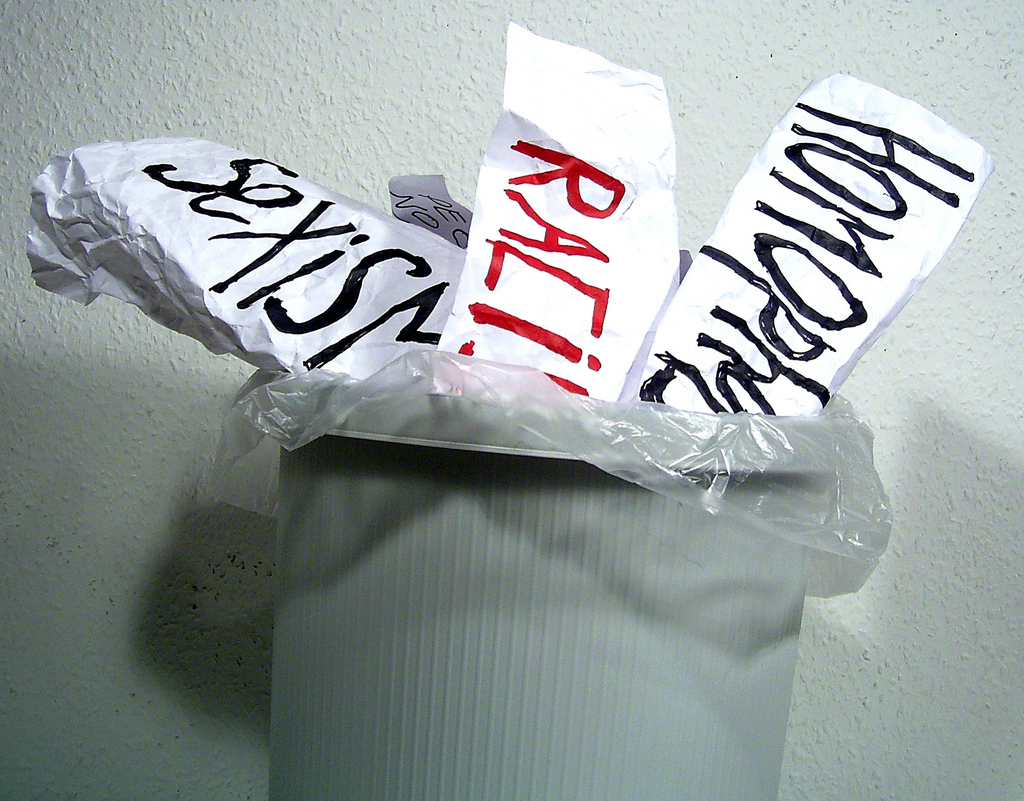By Ashley Mussbacher (The Cascade) – Email
Print Edition: January 7, 2015

In the last two years, Dalhousie University, frosh week, and Jian Ghomeshi have left a lasting impression on Canadians, but for all the wrong reasons.
In 2013 at Saint Mary’s University, nearly 400 students participated in a pro-rape chant glorifying non-consensual sex with underage girls, and attention narrowed on sexism among the young, educated, and privileged. The following September, UBC students would follow SMU by delivering the same chant at frosh week, stoking the blaze in media. Facebook groups like Keep Misogyny out of Canadian Universities (KMOCU) started to spread awareness and channel the attention in a way that was proactive and positive. But with the recent misogyny scandal at Dalhousie University, the question still tugs at our sleeves: what is the best way to handle sexism in universities?
The current topic is the Facebook group “Class of DDS 2015 Gentlemen,” which contained misogynistic posts, and what to do with the 12 Dalhousie students who ran it.
The usual go-to punishment for any offence is the termination of a privilege; in the case of SMU’s student association president Jared Perry, it meant his resignation. The 81 UBC students involved in the chant were assigned community service. But consequences for the fourth-year Dalhousie students are still being discussed, and it looked as though Dalhousie might break the mould.
According to Alison Auld of the Canadian Press, Dalhousie president Richard Florizone announced that discussions were leading to a restorative justice process. All men who were involved would participate. It would be informal and confidential, and it would “explore the impacts of the comments and address accountability.”
Then the students were suspended from January 5 to January 12. One week. According to CBC, a statement posted online is urging Dalhousie to not only focus on the situation at hand, but the underlying causes, pointing out that sexualized violence is a problem at universities across Canada. Suspension seems to be the appropriate response to a minor, temporary offence. But sexualized violence is anything but minor or temporary.
Not everyone agrees with the school’s course of action. A few suggestions were pushed forward, matching the usual formula and response by the general public: Change.org ran a petition to have the students expelled, others tweeted to ban them from practicing dentistry, and a select few from KMOCU made more extreme comments, writing that they thought the male students deserved what they planned to do to the females in their posts.
The issue with these reactions is they’re founded on a need for revenge. The public had a similar reaction to the Jian Ghomeshi case, and The Cascade’s Megan Lambert wrote, “It is not the public’s job to decide who is telling the truth; that’s why we have a formal judicial system.”
But since half of these students’ tuition is paid for by the public, how much power — if any — should the public have in deciding their punishment?
The petition to have them expelled is one way the public is leveraging that power, but they’re doing so at the expense of actually understanding the problem. Expelling the Dalhousie students is not the answer, because it won’t change their attitudes. Sexism isn’t spreading through universities like a disease, because it’s not a disease; it’s a mindset. And changing a mindset is more difficult than expulsion, or fast justice.
It proves we’re still fumbling for an answer to the question of how to deal with sexism. Though, according to comments on Facebook cited by he Canadian Press, the problem wouldn’t have occurred at all if it hadn’t have been public. Regarding the UBC rape chant, CBC writes: “Students say the chant has been used for 20 years, and this year frosh week organizers didn’t prevent it, allowing students to chant it ‘in the bus,’ but not in public.” A commenter on CBC’s website also wrote a response to the Dalhousie scandal: “Whose bright idea was it to explicitly type up this kind of stuff non-anonymously in an open group on Facebook? Why didn’t they just ‘relieve their stress’ in a private IRC channel?”
So, if it’s private, it’s okay … until it’s not? Look how well that worked out for Ghomeshi. In fact, the outcome of the Ghomeshi sexual assault case shows that the prevalent attitude of “boys will be boys” is changing. When The Cascade’s Jess Wind wrote on SMU and UBC rape chants, she mentioned the rise of rape culture, our attitudes around it, and how people are suddenly realizing the message in a 20-year-old chant.
Change starts with recognizing that what the 12 Dalhousie students did was not harmless. Calling their posts “jokes” or chalking it up to male bonding is an excuse. And expelling or suspending them does nothing to prevent something like this from happening again.


